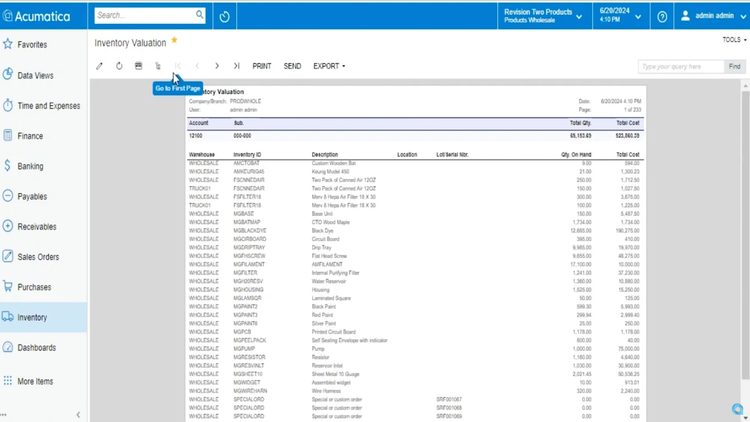Best ERP for Retail Industry
These solutions optimize inventory tracking, reduce waste, and enhance customer experiences. Cloud-based ERP systems are now more affordable, adaptable, and scalable for small to midsize retailers, eliminating the need for major system revamps.
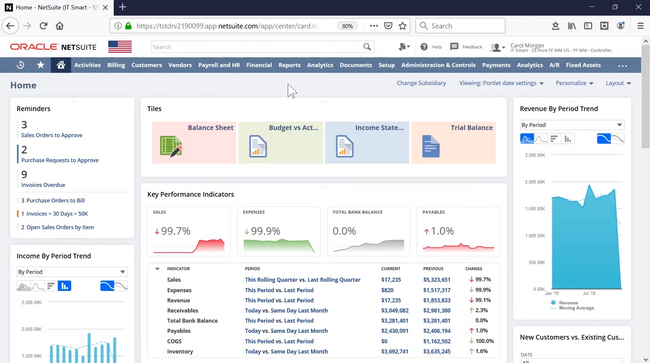
- Hundreds of third-party add-ons available
- Highly customizable
- Scalable, web-based ERP software system
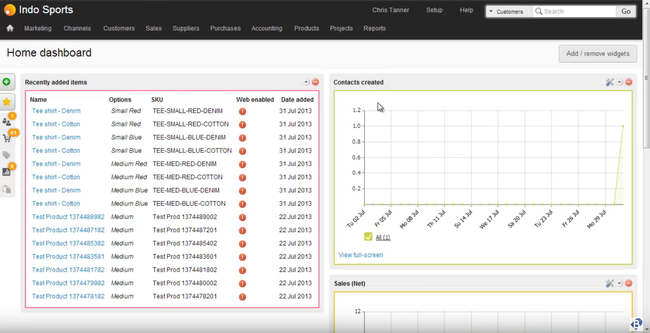
- Handles transactions in multiple currencies
- Inventory management supports multiple warehouse locations
- Extensive integrations
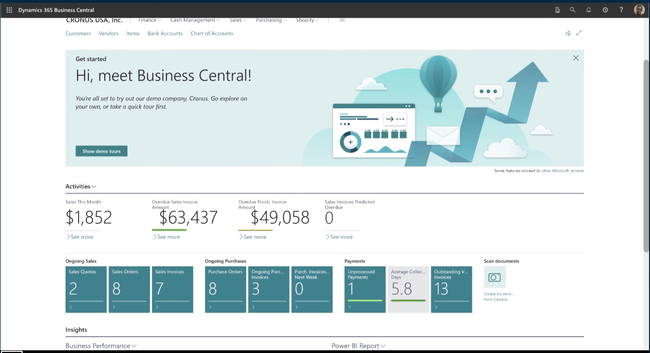
- Combined ERP and CRM
- Similar interface to MS Word and Outlook
- Integrations with Microsoft applications
Retail ERP software connects with eCommerce platforms, shipping apps, and accounting tools, offering a unified view from sales to shipments. When choosing an ERP, check for popular integrations like Shopify, WooCommerce, QuickBooks, and ShipStation.
- NetSuite: Best Overall
- Brightpearl: Strong Retail Analytics
- Dynamics 365 Business Central: Strong Inventory Management
- Acumatica: Great Omnichannel Management
- Odoo: Best for Online Retailers
- SAP Business One: Advanced Inventory Control
- Epicor Eagle: Best POS System
- Sage Intacct: Best Financial Management
NetSuite - Best Overall
NetSuite delivers strong customer information management, aggregating data from different sources like eCommerce platforms, in-store point of sale (POS), and online lead forms. This lets you capture and leverage customer insights directly within the ERP. In this way, NetSuite eliminates data silos and ensures a smooth experience across both online and physical channels.
The Customer 360 View dashboard gives you a complete overview of each individual’s interactions, preferences, and history. The customer scorecard allows you to review KPIs like open sales orders, returns, purchasing trends, and payment status. NetSuite even logs communications like emails or customer service interactions for a full history accessible to any team member.
The sales tab within each profile tracks previous purchases and recommends related products. For example, if your customer frequently purchases outdoor gear, the system may suggest weatherproof jackets or camping supplies. This supports both in-store recommendations and online suggestions. Moreover, you can even add custom fields to records, including segments like “B2C small” or “B2B large,” to better categorize data.
Finally, NetSuite lets you save searches to quickly filter and group customers based on certain criteria, like demographic data or buying history. This feature can help you create more targeted campaigns and boost engagement with relevant messaging, boosting the impact of your marketing efforts.
NetSuite’s plans range from $3,000 per month for up to 30 users to $8,500 per month for larger teams. If you’re looking for a more affordable option, consider alternatives like Odoo.
Read our full review of NetSuite for pros, cons, and ratings.
Brightpearl - Strong Retail Analytics
Brightpearl’s retail analytics module helps omnichannel sellers make more informed decisions across the entire supply chain. The dashboard lets you view crucial KPIs on easy-to-read charts, including:
- CAC: Customer acquisition cost shows you the average amount you spend to acquire a new customer through marketing.
- ROAS: Return on ad spend tracks the total revenue you generate through advertising. It gives you the exact value for each campaign, so you can decide whether it is successful.
- CLV: Customer lifetime value estimates the total net profit you can expect from the average customer.
You can also enhance your item purchasing processes through data analytics. The system uses your product sales data and page views from your online store, helping you prioritize fast-moving items with high traffic. Or, you can consider discontinuing or discounting slow-moving items if the page traffic is still high. This way, you can make the necessary adjustments to your replenishment to ensure you don’t over or understock.
Brightpearl can be purchased as a standalone retail management software or combined with Sage Intacct to create a comprehensive ERP system. It’s an excellent option for omnichannel retailers with online and brick-and-mortar stores needing automated order management and synced inventory. Unfortunately, you’ll need a custom quote for exact pricing figures.
Learn more on our Brightpearl page.
Dynamics 365 Business Central - Strong Inventory Management
Microsoft Dynamics 365 Business Central is a great option for small to midsize retailers looking to centralize their inventory. You can track stock across warehouses, stores, and online channels in real-time to improve accuracy. It automatically updates counts from sales, returns, and transfers, reducing discrepancies. By maintaining a centralized view, you can reduce oversells and stockouts throughout your entire operation.
It supports retail-specific controls, like item variants (size, color, style), replenishment planning, and demand forecasting. The built-in planning worksheets are also effective, helping you set reorder points and vendor lead times. That way, popular products stay in stock while slow-moving ones are controlled. And when paired with retail extensions like LS Central, you can sync them with your POS, too.
Business Central is integrated with various Microsoft applications, such as Office 365, Power BI, and Azure. This allows retailers to maintain a consistent workflow across multiple locations. For instance, quotes, orders, and invoices can be created directly in Outlook, enhancing efficiency.
Acumatica - Great Omnichannel Management
Acumatica ensures real-time updates across multiple channels. This delivers information like inventory levels, order statuses, and customer data is consistent regardless of the channel being used. With Acumatica, retailers can connect their storefront and back office, enhancing the omnichannel shopping experience for customers and ensuring seamless operations for the business.
Acumatica Retail Edition is designed explicitly for omnichannel sales organizations. It provides native connectivity to numerous sales channels, including commerce sites, marketplaces, in-store POS devices, and others. Whether a customer is shopping online from a desktop or mobile device or in a brick-and-mortar store, Acumatica ensures cohesion regarding product availability, pricing, and customer service.
Odoo - Best for Online Retailers
Odoo provides a seamless eCommerce integration, allowing retailers to set up an online store effortlessly. The AI website configurator aids retailers in designing their sites, and they can also select from a range of pre-made industry-specific themes. Furthermore, Odoo equips retailers with tools to enhance their online conversion rates. This includes the integrated tracking tool and the ability to connect to Google Analytics. By understanding visitor behavior, retailers can make informed decisions to increase conversions.
Odoo is a genuine omnichannel platform that connects an online store and other sales channels, such as point-of-sale (POS) or Customer Relationship Management (CRM) systems. This unified system ensures that all sales data, whether online or offline, flows into a central repository.
SAP Business One - Advanced Inventory Control
SAP Business One incorporates a streamlined approach to tracking and tracing items through its batch and serial number management. This is indispensable for efficient product recalls or executing quality assurance checks. Another feature that elevates its value proposition is bin location management. By pinpointing the exact storage locations of items within a warehouse, it not only speeds up the picking process but also simplifies the restocking endeavor.
SAP Business One also offers traceability tools. Retailers gain a clear vantage point from the procurement phase to the point of sale. Advanced shipping and receiving tracking enables retailers to keep an eagle eye on expected arrival or dispatch timelines. Furthermore, the depth of its warehouse tracking is not limited to mere quantity checks; it drills down to the very shelf or bin location of an item.
Epicor Eagle - Best POS System
Epicor Eagle has a unified point-of-sale system, harmonizing the in-store and online checkout experiences. With features such as ‘buy online, pick up in-store’ (BOPIS) and ‘buy online, return in-store’ (BORIS), it creates a fluid shopping journey, blurring the lines between physical and digital realms.
Additionally, Epicor Eagle’s CRM tool is crafted to curate a personalized shopping experience. This system captures, analyzes, and segments customer data from all channels, enabling businesses to deliver targeted marketing campaigns and tailored product recommendations.
Sage Intacct - Best Financial Management
Sage Intacct offers a multidimensional general ledger that empowers retailers with real-time financial and operational insights. Instead of just tracking basic financial data, retailers can gain actionable insights by drilling down into financial performance by store location, product line, or even sales channel.
One of Sage Intacct’s standout features is its automated revenue recognition. As the retail landscape shifts towards subscription models and bundled services, Sage Intacct helps retailers automate and streamline revenue recognition, ensuring compliance with evolving accounting standards.
Another noteworthy aspect is its advanced expense management. Retailers can directly connect their bank accounts and credit cards to Sage Intacct, ensuring real-time transaction updates, further simplifying the reconciliation process and offering immediate insights into cash flow.
What Is a Retail ERP System?
A retail ERP system is a specialized software crafted to support retailers in overseeing various facets of their business. This encompasses financial oversight, supply chain coordination, sales strategies, customer relationships, and inventory control. Tailored specifically for the retail industry, these systems ensure functionalities align perfectly with the nuances of retail operations.
Key Features
Retail ERP software seamlessly consolidates various software applications a business uses into a singular suite. Specifically crafted for the retail industry, it facilitates efficient business operations management and ensures a steady flow of information.
Key features of retail ERP systems include:
- Point-of-Sale (POS) Systems: Directly interfaces with customers during sales.
- Inventory Management: Keeps track of stock and inventory levels.
- Financial Management: Manages business finances, including sales, expenses, and profits; see our roundup on retail accounting software.
- Supply Chain Management: Oversees product flow from suppliers to customers.
- Channel Integration: Ensures coordination between different sales platforms.
- Rewards and Loyalty Management Programs: Engages and retains customers.
- Product Management: Oversees product assortment, pricing, and promotions.
- Warehouse Management Software: Manages storage, dispatch, and receipt of goods.
- Sales Management: Plans and directs the distribution of products.
- Customer Relationship Management (CRM) Software: Manages interactions with customers and potential customers.
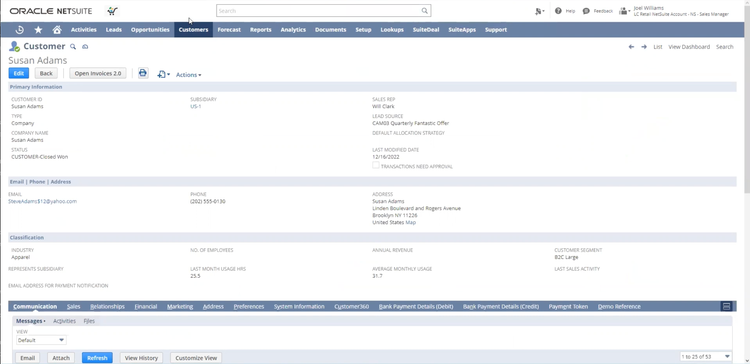
Benefits
ERP systems offer retailers a multitude of advantages:
- Real-time Visibility: Retailers can access live data on inventory, sales, and customer behavior, allowing for strategic decisions on stock levels, reordering, and pricing.
- Inventory Management: ERP tools enhance inventory oversight, ensuring efficient operations and fewer order discrepancies or supply hold-ups. Everything is tracked from start to finish, reducing resource wastage and ensuring smooth operations.
- Customer Service: ERPs store customers’ purchase histories, enabling personalized shopping experiences, thus elevating customer satisfaction.
- Supply Chain Operations: Retail ERP systems optimize supply chain processes, assess individual store performances, and enhance the overall customer journey.
- Efficiency: By eliminating redundant tasks, ERPs streamline workflows, enabling employees to be more productive and driving revenue growth.
- Decision-making: ERP systems equip retailers with insights for informed decisions, from pricing strategies to product offerings, through comprehensive reporting, analytics, and dashboards.
In essence, ERPs are pivotal for modern retailers. They bolster inventory handling, operational efficiency, and customer engagement, and they are instrumental in maintaining a competitive edge in a dynamic retail landscape.
Pricing Guide
For small to midsize retailers, the monthly subscription cost for retail ERP systems typically ranges from $1,700 to $10,000/month. It’s a common industry guideline to allocate approximately 3% of annual sales for retail ERP software expenses.
Retail ERP pricing is influenced by various factors, including:
- Number of Active Users: The number of employees accessing the system.
- Total Employees: The overall workforce size that the ERP needs to cater to.
- Deployment Model: Costs can vary based on whether the system is on-premise or cloud-based.
Beyond the subscription costs, retailers should account for implementation expenses. These initial costs can significantly boost the total cost of ownership (TCO) in the software’s first year. A general rule of thumb for estimating implementation fees is to anticipate an amount equivalent to twice the annual software usage cost.
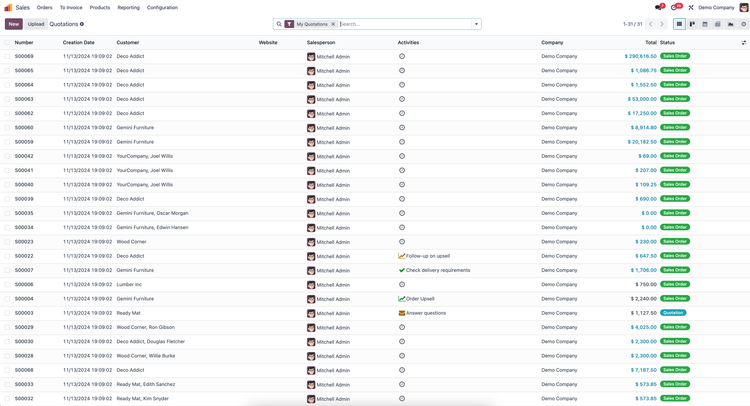
Choosing the Best Sofware
Key Features
The first criterion we consider is the core features of retail ERP. Here are the key functionalities we think every product should have:
- Supplier Management: Efficient tools for managing supplier relationships, streamlining negotiations, and overseeing contract terms.
- Procurement: Streamlined purchase order generation, approval workflows, and order tracking.
- Forecasting: Tools that use historical data and current market trends to predict future sales, stock requirements, and customer behavior.
- Business Intelligence: Advanced analytics tools for deriving insights from sales, inventory, and customer data to drive business strategy.
Costs
We then weigh products based on their pricing flexibility:
- Scalability: Does the pricing model allow for growth, especially during peak seasons like holidays, without excessive costs?
- Feature Tiers: Are essential features available in the basic tier, or are they hidden behind a higher price point?
- Transaction Fees: Does the ERP system charge transaction fees for retailers with a significant sales volume, and if so, how do these compare?
Integrations
To round off our methodology, we prioritize retail ERP that integrates seamlessly with:
- eCommerce Software: Integration with popular eCommerce platforms like Shopify, Magento, or WooCommerce ensures seamless online sales management.
- Point-of-Sale (POS) Systems: For brick-and-mortar retailers, integration with their POS systems is essential for real-time sales data synchronization.
- Payment Gateways: Compatibility with various payment processors like Stripe, PayPal, or Square is crucial for diversified payment options.
- Marketing Tools: Integration with email marketing tools like Mailchimp or CRM platforms for targeted campaigns.
- Third-party Logistics (3PL) Software: Integration with logistics providers for efficient order fulfillment.
- Accounting Software: Seamless data flow between the ERP and accounting tools like QuickBooks or Xero.
